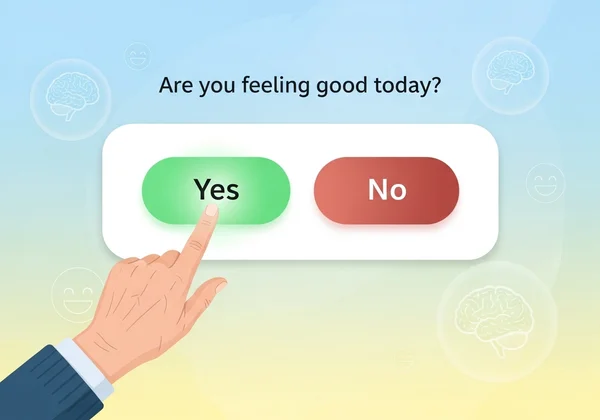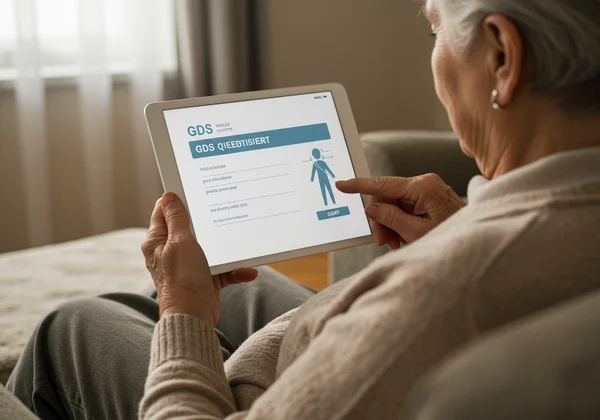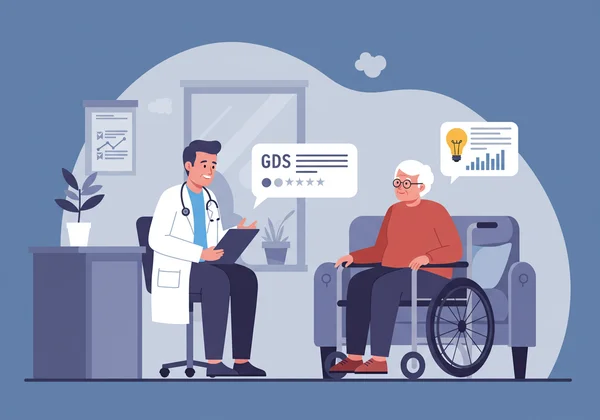Geriatric Depression Scale Guide for Seniors: Boost Your Emotional Well-being
September 2, 2025 | By Arthur Vance
As we navigate our golden years, we focus a lot on physical health—staying active, eating well, and managing chronic conditions. But what about our emotional health? It's just as vital to living a full and satisfying life. Sometimes, it can be hard to put a finger on why we're feeling down or less interested in things we once enjoyed. That's where a helpful tool like the Geriatric Depression Scale comes in. What is the Geriatric Depression Scale (GDS)? It's a simple, private way to check in with yourself and gain a better understanding of your emotional state. This guide empowers you with the knowledge to use this tool, helping you take the first step towards nurturing your well-being. You can start your self-assessment whenever you're ready.

What is the Geriatric Depression Scale (GDS) and Why Use It?
The Geriatric Depression Scale, often called the GDS, is a series of straightforward questions designed specifically for older adults to screen for signs of depression. Created by Dr. J.A. Yesavage and his colleagues at Stanford University in the 1980s, it has become a trusted and widely used tool by doctors, caregivers, and seniors themselves. Unlike other assessments, its "yes/no" format avoids complex scales or confusing questions, making it incredibly user-friendly.
The purpose of the GDS isn't to give you a scary label or a diagnosis. Think of it more like taking your emotional temperature. Just as you might monitor your blood pressure, the GDS provides a snapshot of your mood over the past week. It helps you notice patterns or feelings you might otherwise dismiss as just "a normal part of aging." Recognizing these feelings is the first, most powerful step toward making positive changes.
Understanding the GDS: A Simple Tool for Your Emotional Check-up
At its core, the GDS is an emotional check-up. The questions focus on how you've been feeling, rather than on physical symptoms, which can sometimes be related to other health issues in older adults. You'll be asked about your satisfaction with life, your level of interest in activities, and your general outlook. Because the questions are direct and require a simple "yes" or "no," you can complete the screening quickly and without stress. It's a moment of private reflection, a chance to be honest with yourself about your feelings in a safe, non-judgmental way. This mood assessment can provide clarity when your emotions feel jumbled.

Why Senior Self-Assessment Matters for Your Well-being
Taking charge of your emotional health is one of the most empowering things you can do. A senior self-assessment for mental health allows you to be proactive rather than reactive. Instead of waiting for feelings of sadness or emptiness to become overwhelming, you can identify them early. This early awareness opens the door to conversation and support long before a small issue becomes a major problem. It puts you in the driver's seat of your own well-being. By using a free GDS assessment, you are gathering personal insight that can help you live a more joyful and engaged life.
Your GDS Test: How to Take It for Personal Insight
Taking the GDS test is a simple and private process. It's a personal quiz about you, for you. The goal is to get an honest reflection of your feelings so you can better understand your emotional health. Our platform is designed to be easy to use, ensuring a stress-free experience from start to finish. Ready to see how it works? You can take the free GDS online at any time.
Choosing Your GDS Version: 15-Item vs. 30-Item
One of the great features of the GDS is its flexibility. You can choose between two versions, and both are scientifically validated. The most common version is the GDS Short Form, which has 15 questions. This is an excellent starting point if you want a quick check-in. It's fast, effective, and gives you a reliable initial look at your emotional state.
There is also a Long Form with 30 questions. This version provides a more comprehensive assessment. It can be useful if you want a deeper dive into your feelings. Both versions are available online, and you can choose whichever one feels right for you. There's no wrong choice; what matters most is taking that first step.
Answering Honestly: Getting the Most Accurate Reflection
To get the most value from your GDS test, honest answers are key. Remember, this is a confidential and private tool. Your results are for your eyes only. There are no right or wrong answers, only your answers. Try to respond based on how you have felt over the past week, not just today. Don't overthink the questions; your first instinct is often the most accurate. This is your personal moment to reflect on your well-being, and being truthful with yourself is an act of self-care.
Getting Your GDS Score: What Happens Next?
Once you've answered all the questions, you will receive your GDS score instantly. The platform automatically calculates your result and provides a preliminary interpretation. This immediate feedback helps you connect your answers to a clear outcome. On our platform, we also offer an optional, unique feature: an AI-powered personalized report. This report goes beyond the number, translating your score into actionable insights, highlighting your strengths, and suggesting areas for focus. It's a unique AI-powered report, offering actionable insights and personalized guidance to complement the trusted GDS framework.

Understanding Your GDS Score & Taking the Next Steps
Receiving your score is just the beginning of your journey toward emotional wellness. The number itself is simply data; its real power lies in what you do with it. Interpreting your GDS score is not about self-diagnosis but about self-awareness. It's a stepping stone to having meaningful conversations and making informed decisions about your health. Remember, knowledge is power, and this is valuable knowledge about yourself. You can take the screening now to understand your score.
What Does My GDS Score Mean for My Emotional Health?
Your GDS score falls into a range that suggests a certain level of depressive symptoms. Generally, a lower score (e.g., 0-4 on the short form) indicates that significant symptoms of depression are unlikely. A score in the middle range may suggest mild depression, while a high score indicates moderate to severe symptoms. This geriatric depression scale score interpretation is a guideline. It can validate feelings you've been having or bring attention to a potential issue you hadn't fully recognized. Seeing the score can be the motivation you need to take the next important step.
Starting a Conversation: Talking with Your Doctor or Family
Your GDS results are an excellent tool for starting a conversation with a healthcare professional. Instead of saying "I just feel down," you can say, "I took the Geriatric Depression Scale and my score was X, which suggests I might be struggling." This gives your doctor concrete information to work with. It can also be a helpful way to talk to family or trusted friends about how you've been feeling, allowing them to better understand and support you. You don't have to carry these feelings alone; your GDS score can be the key to unlocking the support you deserve.
Remember: The GDS is a Screening Tool, Not a Diagnosis
This is the most important takeaway. The GDS is a valuable screening tool, but it is not a diagnosis. Only a qualified medical professional, like a doctor or a psychologist, can diagnose depression. Your score is a starting point, an indicator that a follow-up conversation is a good idea. Think of it like a smoke detector: it alerts you to potential smoke, but you need a firefighter to confirm if there's a fire and what to do about it. The GDS alerts you to your emotional state so you can seek professional guidance.

Empowering Your Emotional Health Journey with GDS
Your emotional well-being is a continuous journey, and the Geriatric Depression Scale serves as a wonderful compass to help you navigate it. It provides a simple, private, and empowering first step to understanding your feelings. By using this tool, you are investing in your own happiness and quality of life. You are choosing awareness over uncertainty and action over inaction.
Your well-being matters. If you're ready to gain valuable insight into your emotional health, the tool is waiting for you. It's free, confidential, and easy to use. Take your confidential GDS assessment today and take a positive step forward on your path to emotional wellness.
Frequently Asked Questions About the GDS for Seniors
What is the Geriatric Depression Scale (GDS)?
The GDS is a self-report questionnaire designed specifically for older adults to screen for depression. It uses a simple "yes/no" format to ask about mood, interests, and overall life satisfaction, making it an easy-to-use emotional check-up tool.
What is the GDS short form?
The GDS short form is a condensed 15-question version of the original 30-question scale. It is the most commonly used version for quick, reliable screening and is highly effective at indicating potential depressive symptoms.
What does a high score on the Geriatric Depression Scale mean?
A high score suggests that you may be experiencing significant depressive symptoms. It serves as a strong indicator that you should schedule a follow-up appointment with a doctor or mental health professional for a full evaluation. It is a sign to seek support, not a final diagnosis.
Is the Geriatric Depression Scale a diagnostic tool?
No, it is not. The GDS is a screening tool, not a diagnostic instrument. It can identify the potential presence of depression, but a formal diagnosis can only be made by a qualified healthcare provider after a comprehensive assessment. You can use the results from the GDS online tool to start that important conversation.
What is a normal score on the Geriatric Depression Scale?
On the 15-item short form, a score between 0 and 4 is generally considered within the normal range and suggests depression is unlikely. However, everyone's "normal" is different, and any concerns about your emotional health should always be discussed with a professional.